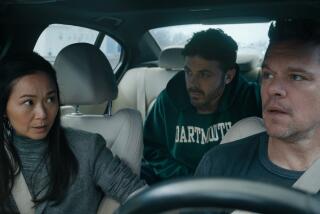MOVIE REVIEW : CRIME AND CORRUPTION IN ‘THE UNTOUCHABLES’ : ‘THE UNTOUCHABLES’
In “The Untouchables” (citywide), director Brian De Palma serves up a moral dilemma, 1930s style: Can a very, very good man--Eliot Ness--battle a very, very evil one--Al Capone--without sinking to his opponent’s level of corruption?
It’s a juicy premise with moral shadings that might be expected to intrigue playwright/screenwriter David Mamet (“Glengary Glen Ross,” “The Verdict”). And it’s an overripe, operatic period in American corruption that would seem to be a natural for “Scarface’s” De Palma.
For the record:
12:00 a.m. June 10, 1987 FOR THE RECORD
Los Angeles Times Wednesday June 10, 1987 Home Edition Calendar Part 6 Page 4 Column 1 Entertainment Desk 1 inches; 31 words Type of Material: Correction
In a film review of “The Untouchables” last Wednesday and a television column on the film and TV series on Monday, it was erroneously stated that Eliot Ness committed suicide.
In fact, Ness died May 16, 1957, of a heart attack.
Sure enough, “The Untouchables” has a great look; two big action set-pieces and a pair of performances by old-pro smoothies, Sean Connery and Robert De Niro, which might be reward enough for moviegoers tired of the jangling assault of current movies. But those are its pluses.
What you never get from “The Untouchables” is the sense of cumulative corrosion that must have overcome Ness, whose life was more complex than the film makers hint at. Mamet does little to characterize men on either side of the law--only the white-suited Frank Nitti (Billy Drago) stands out in Capone’s gang, and Ness’ nine hand-picked good guys have been reduced to three: Connery, Andy Garcia and Charles Martin Smith, Chicago cops and/or accountants who can inexplicably ride horses like John Wayne and shoot like Sgt. York.
It’s easy to believe that De Palma’s heart isn’t with his straight-Arrow-collar hero Ness (Kevin Costner), who has a boring wife, a boring house, an adorably boring child and a private life so stultifyingly dull you suspect De Palma/Mamet of sly satire and brace yourself for the kicker that never comes. (The wife, child and home life are all fictitious anyway--you might think that if the film makers were going to go to the trouble of making up characters, they might have put a little life in them.)
From the evidence of his past movies, this good, dull straitjacket within which Kevin Costner operates doesn’t seem to be his fault. He had a devilish, steal-the-film flair in “Silverado,” and he was interesting even when the movie wasn’t in “American Flyer.” As the dead-central character of “The Big Chill,” only Costner’s cuff links showed and even they were more interesting than Eliot Ness.
It’s the moments with Sean Connery, as the disillusioned, dryly knowledgeable Irish street cop who will become Ness’s profane father-figure, or the even briefer moments with the flamboyant, murderous Capone, that seem to get the movie’s real juice.
Lumpish again (you begin to worry for De Niro’s heart with all his adding and shedding weight), and icily murderous when he needs to be, De Niro’s very brief scenes give the movie its rare and very needed feelings of danger, and its rare shafts of humor.
Capone’s surroundings seem, in memory, to be all marble or gilt or malachite--the trappings of a Roman senator. You can understand how the Chicago press ate up his pronouncements, given so freely and so regally from the steps of the Lexington Hotel. Given the choice between Ness, and his rallying cry of “Let’s do some good,” and the lurid, quotable corruption that was Capone, you can feel De Palma moving toward the man with the heat, too.
(Director De Palma also fell into those larcenous Chicago ways with a vengeance: The sequence that will probably be remembered longest in “The Untouchables” is its baby-carriage-on-the-steps shoot-out. As any film student will be quick to tell you, it’s a scene that’s already stood a 52-year test of time. It’s a liberal borrowing of the great Odessa steps montage from Sergei Eisenstein’s masterly “The Battleship Potemkin.” The Eisenstein version, however, moves ; De Palma’s lumbers, redundant and reverential.)
“The Untouchables’ ” technical side is exemplary, however. In particular there are the production designs of Patrizia von Brandenstein; Stephen H. Burum’s camerawork, both fanciful and realistic; the costuming of Marilyn Vance and Richard Bruno and Jerry Greenberg’s editing.
In telling his fairy tale with real characters, De Palma has touched the truth only occasionally. Yes, Capone was indeed a victim of the tax man. No, Frank Nitti did not meet death with a “Vertigo”-like Hitchcock flair. In fact, Nitti--like Ness--was a suicide. The shock is how gray and undifferentiated most of these wild men have become.
Ness, a suicide. There’s a story with an almost Greek ring to it. Where, under his stainless-steel incorruptibility, was Ness’ gnawing flaw? To Mamet and De Palma, goodness and dullness seem inseparable. The film makers have labored long to create a character as monotonous as Robert Stack’s television Ness. (The film’s R rating is for language and both general and specific acts of violence.)
It’s strange that in this somber inspection of moral fiber and what causes it to fray, De Palma couldn’t have made his hero at least as interesting as his villain, and both of them at least as complicated as they were in life.
‘THE UNTOUCHABLES’ A Paramount Pictures release. Producer Art Linson. Director Brian De Palma. Script David Mamet. Camera Stephen H. Burum. Editor Jerry Greenberg. Visual consultant/production designer Patrizia von Brandenstein. Art director William A. Elliott. Music Ennio Morricone. With Kevin Costner, Robert De Niro, Sean Connery, Charles Martin Smith, Andy Garcia, Patricia Clarkson, Billy Drago, Vito D’Ambrosio.
Running time: 1 hour, 59 minutes.
MPAA-rated: R (persons under 17 must be accompanied by parent or adult guardian).
4 lines of 14p to cover both: ness above, and capone right
More to Read
Only good movies
Get the Indie Focus newsletter, Mark Olsen's weekly guide to the world of cinema.
You may occasionally receive promotional content from the Los Angeles Times.










